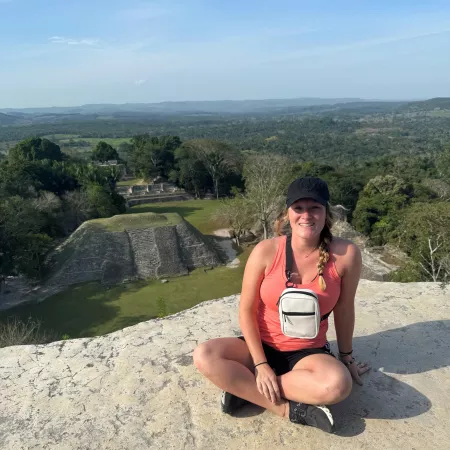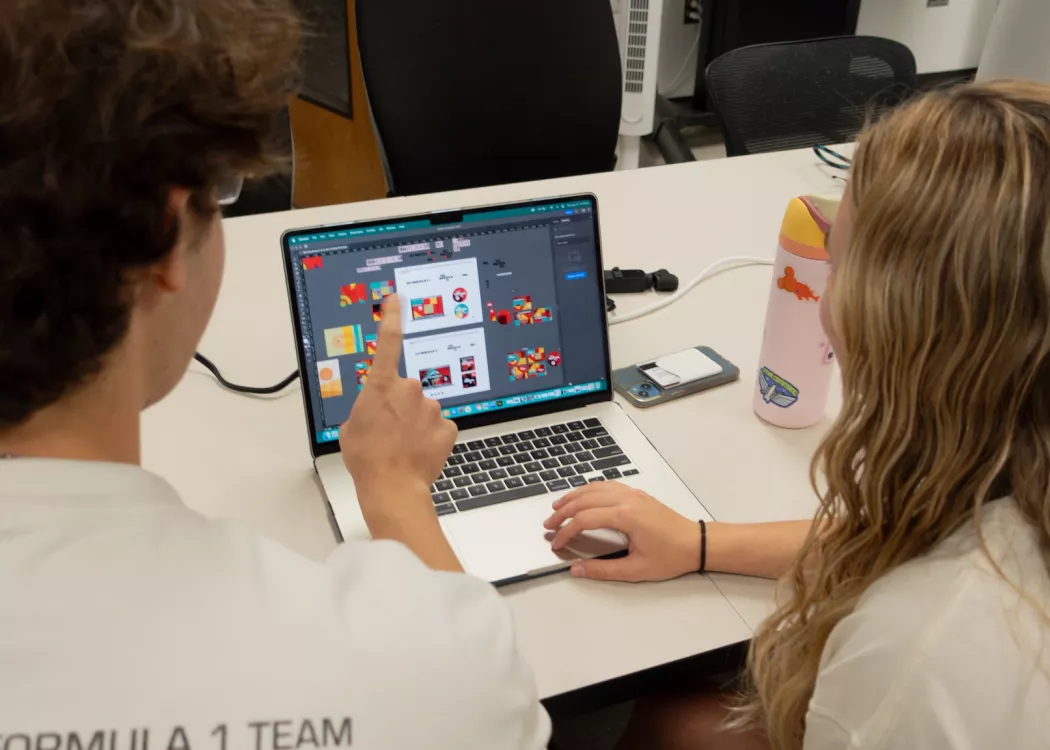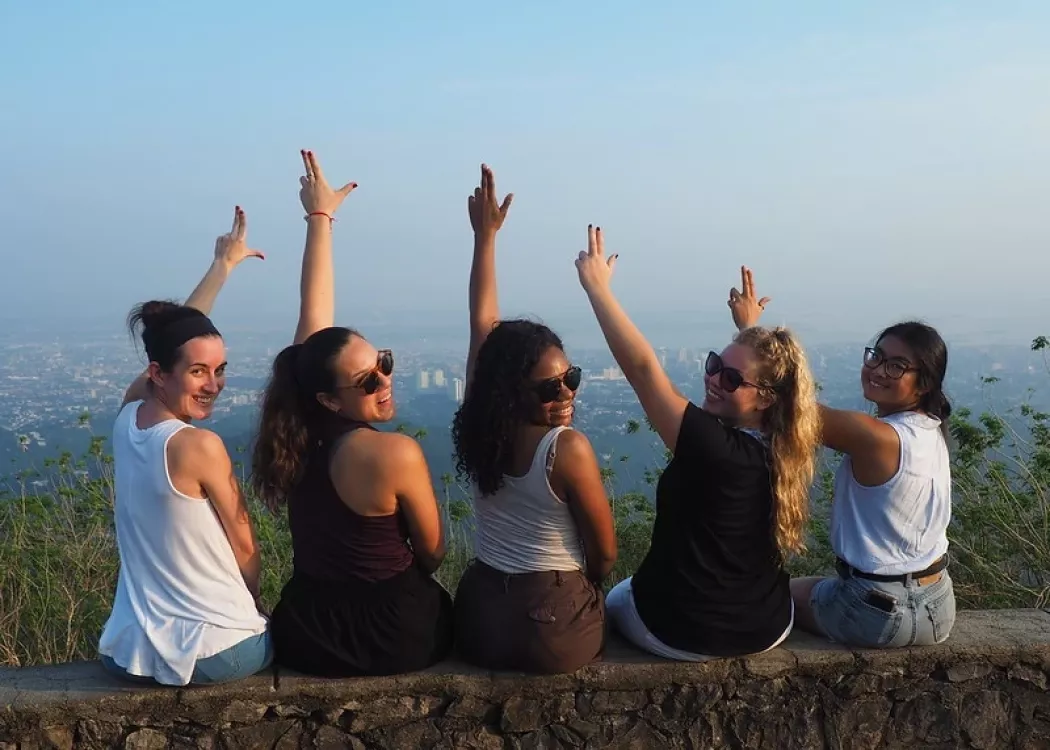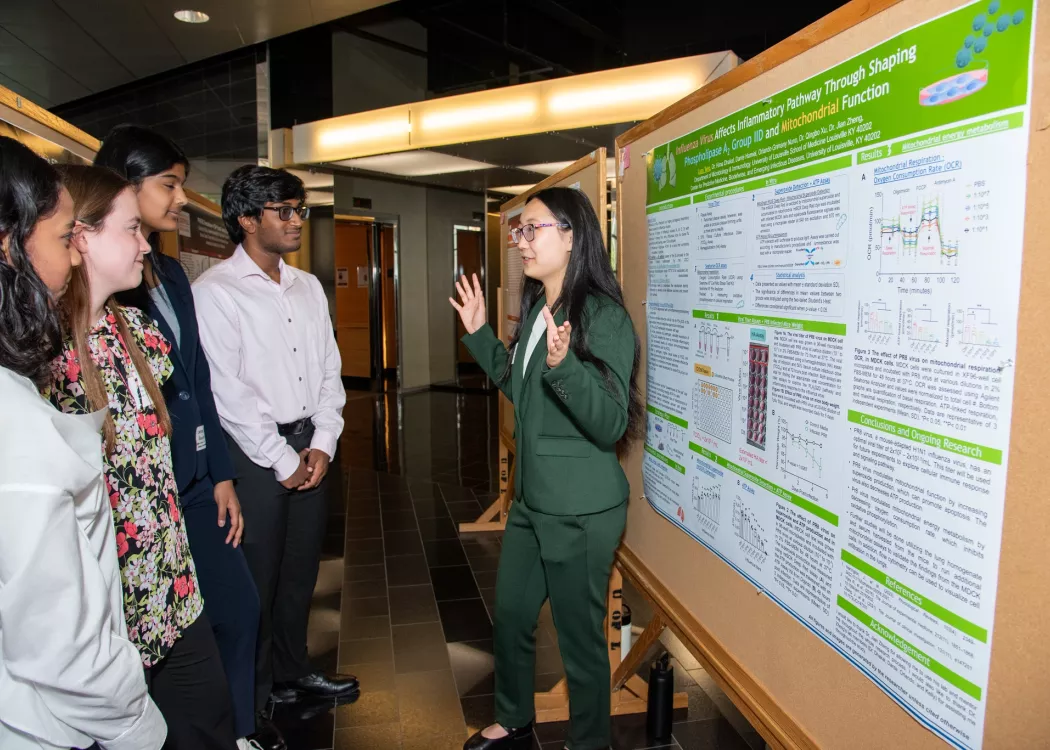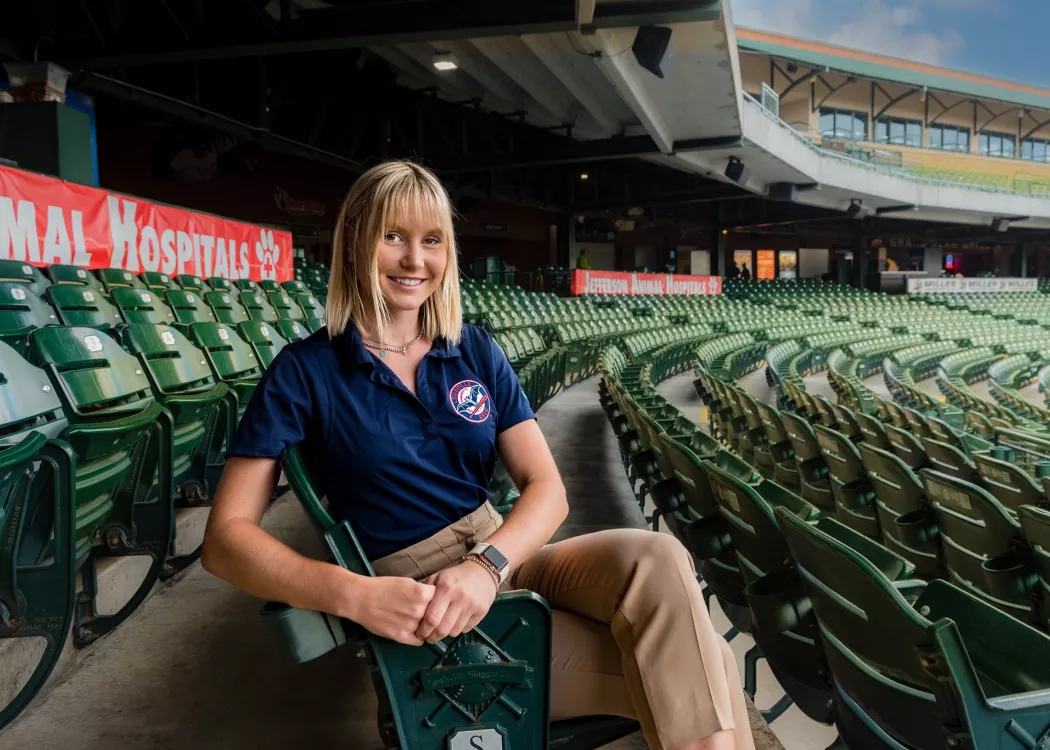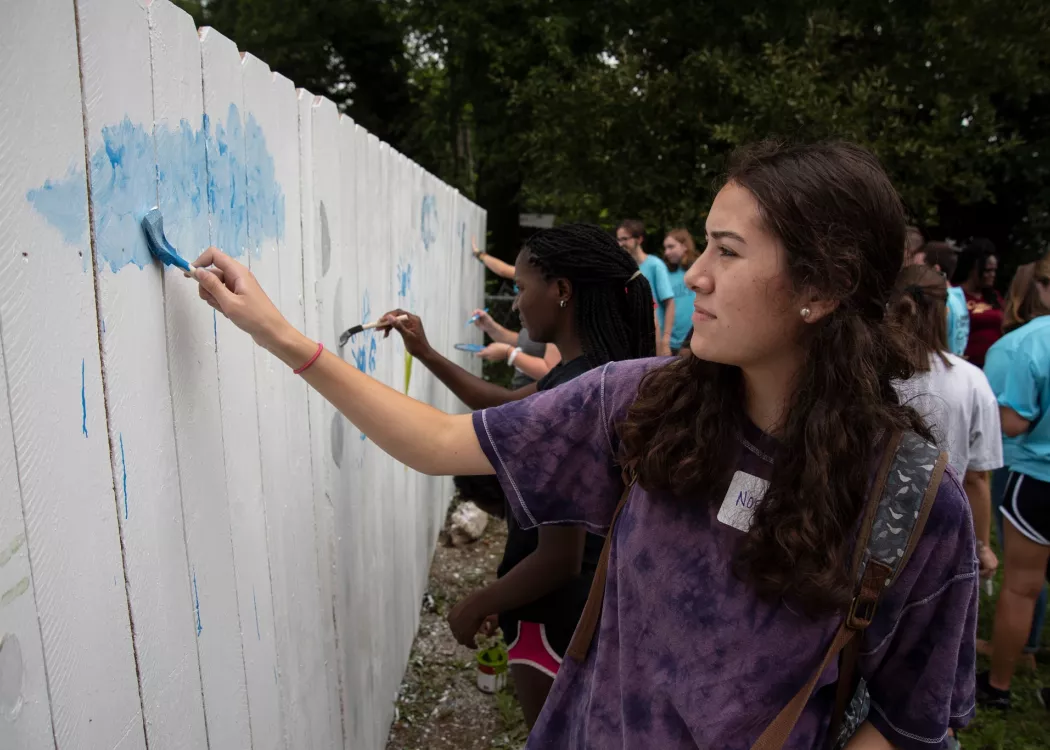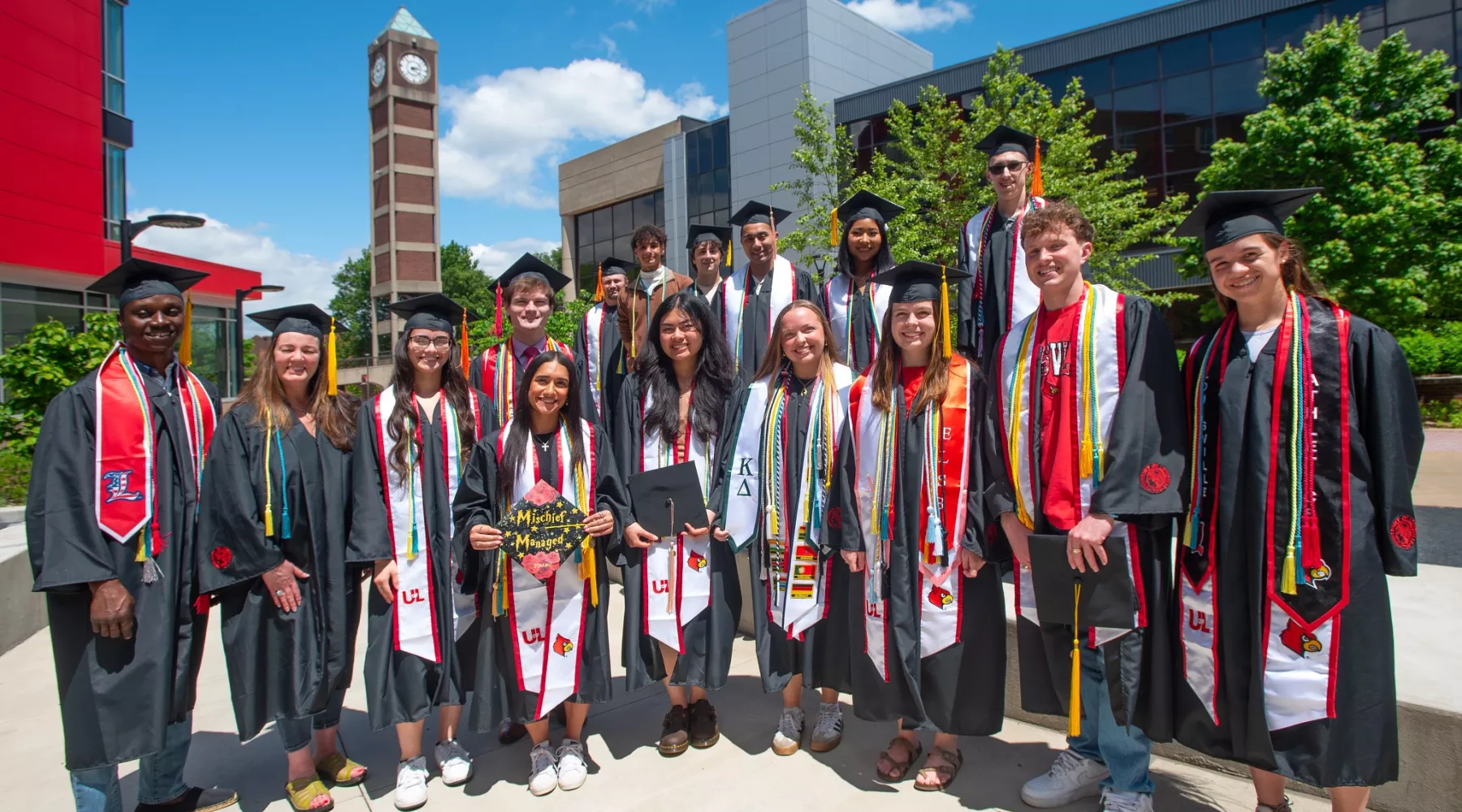
CARDS EXCEL
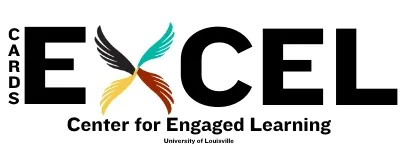
CARDS (Conceptualize, Adventure, Research, Develop, Serve)
EXCEL (Expand the Classroom through Engaged Learning)
Engaged learning allows you to expand your knowledge and gain skills to further prepare you for life after graduation. Undergraduate students who complete two or more qualifying engaged learning activities and submit reflections on those experiences are eligible to earn the CARDS EXCEL distinction cord at graduation.
To earn the CARDS EXCEL distinction, undergraduate students will need to complete two experiences that fall under the following engaged learning categories
Students are encouraged to complete experiences from different categories
💡 Conceptualize
Engage in conceptualization, application and entrepreneurship
Examples include:
Business Plan Competitions
Industry Projects
Senior Capstone Course Projects (CUE Course)
Academic Student Competition Teams
🧭 Adventure
Seek adventure by engaging with the global community
Examples include:
Study Abroad
International Service Learning Program (ISLP)
International Internships
International Co-ops
International Research Experiences
🔬 Research
Improve lives through research, creativity and discovery
Examples include:
Visual & Performing Arts
Creative Humanities
Mentored Research Experience
Intensive Summer Research Experiences
🚀 Develop
Hone career and leadership skills to apply to future career endeavors
Examples include:
Co-ops & Internships (general part-time and full-time jobs are not considered unless directly related to a student's major/minor or career focus areas)
Practicums/Student Teaching/Clinical Experiences
Student Organization Leadership
Student Government Position
Greek Life Leadership
REACH Peer Tutor or Academic Coach
Leadership Development Programs
ROTC
UofL (D1) Student Athlete
🫶 Serve
Serve your local and global community through community engagement opportunities
Examples include:
Service Learning
K-12 Outreach
Engage Lead Serve Board
Community-Based Learning Courses
How does it work?
1
🎯 Participate in Engaged Learning Experiences
Undergraduate students complete two qualifying experiences from at least one of the five categories: Conceptualize, Adventure, Research, Develop and Serve.
Find an Experience about2
💻 Create a CARDS EXCEL Account
Start your journey toward earning CARDS EXCEL distinction and graduation cords by creating your account.
Create an Account about3
📝 Submit Engaged Learning Reflection(s)
After each experience, submit a reflection through your account. You’ll need two approved reflections by your graduating semester. The Center for Engaged Learning will review each submission and notify you if edits are needed.
📌 To help guide your reflection, please take a moment to review the reflection questions and evaluation rubric listed below before you begin.
Submit a Reflection about4
✅ Submit Final Application
During your graduating semester, submit the CARDS EXCEL Final Application.
📅 May 2026 graduates submit by: April 29, 2026
📅 August & December 2026 graduates submit by: December 2, 2026
⚠️ The CARDS EXCEL Program is currently open to undergraduate students only
Submit Final Application about5
🔍 Application Review
The Center for Engaged Learning will review your reflections and final application. You’ll be notified if your materials are approved or need revisions.
6
🎓 Pick-up your graduation cords
Once approved, you can pick up your cords during your graduating semester.
📅 May 2026 graduates: Cord pick-up is May 4-8, 2026 at the Center for Engaged Learning
If you need your cords before the week of May 4-8, 2026, please contact cel@louisville.edu to make arrangements
7
🎉 Celebrate!
Wear your cords at graduation and celebrate your accomplishment!
🎓 May 2026 Graduates
🎓 Aug. & Dec. 2026 Graduates
Reflecting on Engaged Learning Experiences
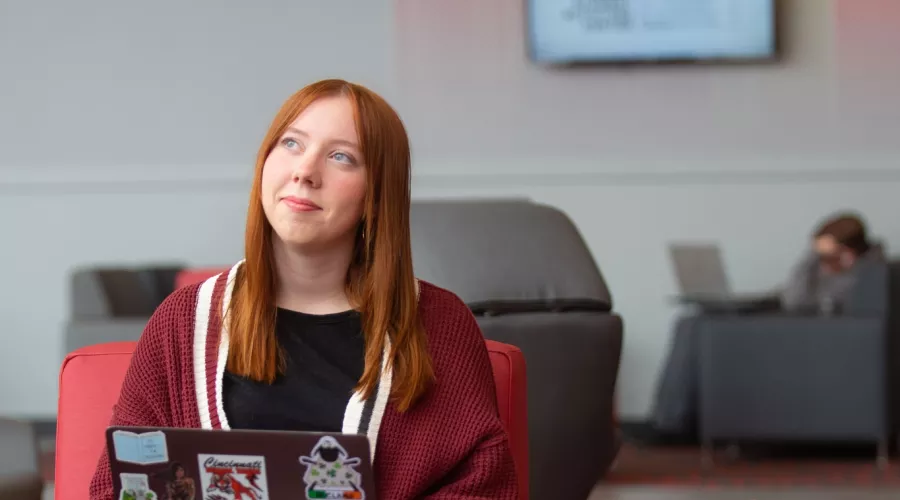
The Importance of Reflection
Reflection is a key part of engaged learning—it connects your experience to learning outcomes, deepens academic understanding, and builds awareness of your impact on the community.
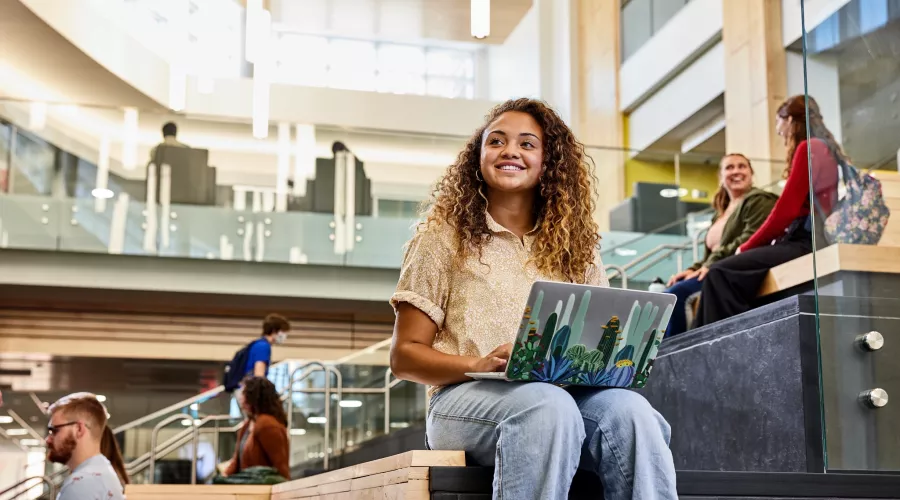
The Benefits of Reflection
• Links academic knowledge to real world experiences through transfer of learning
• Challenges students to assign meaning to their engaged learning experiences
• Prepares students to showcase skills in resumes and interviews for jobs and further educational opportunities
Reflection Questions & Evaluation Rubric
Students will be asked to provide detailed responses to the following reflection questions:
- Provide a clear and detailed description of your participation, activities, and responsibilities in the engaged learning experience.
- Provide specific examples of how you were able to apply the knowledge, skills, or concepts you’ve learned in your degree program or coursework to your engaged learning experience.
- Describe in detail at least three new skills, competencies, or pieces of knowledge that you gained through participating in this engaged learning experience.
- How has participating in this engaged learning experience helped deepen your understanding of yourself and your passions in terms of your future academic and/or professional goals.
CARDS EXCEL reflection responses should include these elements in order to meet or exceed the CARDS EXCEL application requirements.
Reflection Question | Criteria to Meet or Exceed CARDS EXCEL Requirements |
1 |
|
2 |
|
3 |
|
4 |
|
Reflection Examples
Engaged Learning Experience: Capstone Course Project
Student Major: Mechanical Engineering
Question #1 - Provide a clear and detailed description of your participation, activities, and responsibilities in this engaged learning experience.
My capstone project was to design a testing rig for impact on a smart ski helmet. During the project I was the builder. Our POC’s for the project requested that a dummy head be made that could house several different sensors to measure force and acceleration. I had the idea to 3D print the head with custom made mounts to support the requested sensors. I started with a premade 3D model that was supposed to closely resemble that of a person’s head. I took the model and made modifications to it such as making it hollow and building the mounts for the sensors. I communicated with staff in Sackett Hall to let me print the head using one of the 3D printers there. After checking the dimensions of the head, it barely fit on the printer and took nearly 40 hours to print. We ended up making a number of revisions that required a second head to be printed for our final prototype. Luckily, both heads printed well and performed as we expected. The other part of the project was a wooden structure to hold a sledgehammer and the 3D printed head. Using measurements from my team I cut every board to their measurement and drilled every screw using the appropriate power tools which I had experience with from my past.
Question #2 - Describe in detail how you were able to apply, or make relevant, the knowledge, skills or concepts you learned in your coursework as part of this engaged learning experience. Additionally, share at least two new skills that you gained.
The team collaborated on a number of different items that we learned about directly from our course work. One of the best examples of this was a sleeve that functioned as a journal bearing that was inserted into the hammer handle. As engineering students, we learned about bearings extensively in machine design 1 and 2 and would not have been able to select a correct journal bearing for our project if we had not already been taught. There was a number of calculations that had to be done in order to ensure the hammer struck the head at the right height and provided the right amount of force. All the force calculations of the hammer impacting the head were learned from the mechanics of materials class. I also ran several FEA simulations on our setup which we were taught during our computer aided design class.
Question #3 - Provide at least one relevant example of how this engaged learning experience required you to analyze and/or evaluate information or situations in new ways.
When we were first given our capstone project, we were provided with little to no direction on how it should be built other than our testing rig could not utilize drop testing. In order to stay under budget new ideas had to be thought of that would achieve the goals of the project while still being cost effective. This proved very challenging as many ideas that came up were too expensive for us to do or were too difficult given our time constraints and tools. With my knowledge of power tools and the team’s research and ideas we arrived at a design that we were capable of creating and could achieve in the time frame we were given. Our final prototype was cost effective and fully functional. This experience taught me how to create something with many different constraints such as time and cost.
Question #4 - Describe in depth how participating in this engaged learning experience advanced your future academic and/or professional goals? Describe how this experience helped deepen your understanding of yourself, including your passions, interests, and values.
This experience greatly advanced my professional goals in teaching me what it’s like to develop a product from scratch that will then be brought to the market for customers to purchase. I believe my future career will be in developing new products that will be sold to potential customers. I learned there are so many different aspects to developing a product from understanding the customers’ wants and desires to realizing all the risks involved when setting out to do so. I also learned how important it is to make a quality product to maintain a good image with customers. You may be able to make something cheap that doesn’t last but no one will appreciate you for it or consider buying from you again. A poorly put together product can even be dangerous such as a poorly assembled toaster that shocks the user. I have learned that it’s worth the extra time and effort to create a product with a certain quality people will enjoy than it is to create something as quickly as possible that will inevitably fail. I believe my role in the capstone project further developed my beliefs as an engineer in creating something we were all proud of and functioned to the best we could make it
Engaged Learning Experience: Community Engagement
Student Major: Social Work
Question #1 - Provide a clear and detailed description of your participation, activities, and responsibilities in this engaged learning experience.
Since its opening in October 2024, I have been an active volunteer at the Ahava House, a free clothing closet that operates one Friday and Saturday each month. The Ahava House provides clothing, shoes, household goods, bedding, toys, books, meal kits, and more—completely free of charge and without any requirements or documentation. Visitors are encouraged to take what they need, stay as long as they wish, and return as often as necessary. The mission of the Ahava House is to meet the immediate, tangible needs of individuals and families in our surrounding communities. While we serve many individuals from Shelby and Spencer Counties, we have also welcomed guests from other neighboring areas. Our April opening was right after the flood in Frankfort, so we saw many families from Franklin county. During our open weekends, I interact with visitors by assisting them in finding items, offering encouragement, and helping them carry the items they found to their vehicles. I often encourage guests to take more than they think they need, emphasizing that the opportunity is there to support them without restriction or judgment. These interactions provide opportunities to build trust and offer emotional support through casual, yet meaningful conversation. In preparation for opening weekends, I visit local thrift stores to purchase needed items, using my own funds. Other volunteers often provide a list of high-need items, and I work to source those in advance. I also coordinate community donations, picking up items from individuals who are unable to deliver them personally. Additionally, I assist with laundering and organizing clothing, setting up the space, and promoting the mission of the Ahava House through outreach and networking with community organizations.
Question #2 - Describe in detail how you were able to apply, or make relevant, the knowledge, skills or concepts you learned in your coursework as part of this engaged learning experience. Additionally, share at least two new skills that you gained.
One of the most relevant theoretical frameworks I have applied through this experience is Maslow’s Hierarchy of Needs. The Ahava House directly addresses the foundational tier of the hierarchy—physiological needs such as food, clothing, and shelter. By helping to meet these essential needs, we create space for individuals to pursue higher-level needs related to safety, belonging, and personal growth. When basic needs are met, individuals can focus on bigger, more pressing issues that they are facing. Through this work, I have developed stronger communication skills, especially in the areas of reflective listening and empathetic responding. These skills were introduced in my social work coursework and traditionally used in therapeutic settings. I’ve noticed that when individuals feel supported and safe, they often begin to share parts of their story. In those moments, I’m able to apply therapeutic listening techniques to validate their experiences and offer compassionate support, even in brief conversations. Additionally, I’ve developed skills in community outreach and networking. I have built relationships with local organizations serving Shelby County and expanded our reach through social media platforms. These efforts have led to an increase in both donations and community awareness, allowing the Ahava House to serve more individuals. It’s been deeply rewarding to see how classroom concepts related to generalist social work and macro practice come to life.
Question #3 - Provide at least one relevant example of how this engaged learning experience required you to analyze and/or evaluate information or situations in new ways.
As the Ahava House grew in popularity, I began to think critically about how to increase our visibility and better reach those in need. Initially, we used traditional methods like flyers, but it became clear that these had limitations in reach and accessibility. I began exploring the use of local Facebook groups such as “The Haps of Shelbyville” and “What’s Happening in Shelbyville” to promote our open weekends. These online communities quickly proved to be powerful tools for connecting with a broader audience and we saw attendance grow. Through these posts, I was introduced to other community networks such as Give and Get Shelbyville and Zacc’s Baby Depot, which offers diapers and other essentials to parents in need. Evaluating the limitations of our initial outreach approach and shifting to a digital one demonstrated the value of adaptability and innovation in social work practice. By building relationships with these organizations, we not only increased our visibility but also strengthened our referral network and donation base which has allowed us to reach and serve more people!
Question #4 - Describe in depth how participating in this engaged learning experience advanced your future academic and/or professional goals? Describe how this experience helped deepen your understanding of yourself, including your passions, interests, and values.
Volunteering at the Ahava House has significantly shaped both my personal and professional growth. It has affirmed my passion for social work and deepened my understanding of what it means to serve others with empathy, dignity, and respect. Being part of something larger than myself, where I can directly impact lives, has brought me a sense of purpose and fulfillment. This experience has also helped clarify my professional goals. I’ve discovered a strong interest in case management, particularly in roles where I can build relationships with individuals over time and help them set and achieve their goals. The connections I’ve made with returning guests has been especially meaningful. I love hearing about their progress and seeing photos of how they’ve used the items they picked out. It’s made me realize how much I value long-term, relationship-based work. In addition, mezzo and macro social work does not seem as intimidating as it once was. I know that I can make make connections, engage, and network on a community level because of my work with the Ahava House. Personally, I’ve also become more resourceful and financially mindful. I’ve taken up couponing and frequent thrift stores to source items for the Ahava House. Finding affordable resources has become both a practical skill and a personal joy. I genuinely look forward to opening weekends and the people I’ll meet. This experience has reinforced my core values of compassion, equity, and community, and I know it will continue to shape my path as a future social worker.
Engaged Learning Experience: Internship
Student Major: Chemistry
Question #1 - Provide a clear and detailed description of your participation, activities, and responsibilities in this engaged learning experience.
I worked as a Chemical Lab Intern at a national corporation. My primary role within the lab was to collect samples throughout the plant with proper PPE and analyze them via viscometry, NIR spectroscopy, and differential scanning calorimetry. I worked in this role 20 hours per week while making myself available for extra shifts when the lab was short-staffed. I referenced on each viscometer tube as well as all spectroscopy and calorimetry instruments at the beginning of each shift. I also maintained a clean and prepped lab space to maximize time efficiency and remove potential points of inaccuracy. This included restocking while instruments are running or decluttering to ensure an accurate mass is recorded on the balances.
Question #2 - Describe in detail how you were able to apply, or make relevant, the knowledge, skills or concepts you learned in your coursework as part of this engaged learning experience. Additionally, share at least two new skills that you gained.
Much of the experience I’ve received in the chemical lab is applicable to information I learned throughout my undergraduate chemistry degree. In organic chemistry, we discussed functional groups such as alkenes and phenyl rings and how they affect the properties of molecules. The styrene monomer contains a phenyl ring, which adds bulk to the polymer and hinders movement and elasticity. IR spectroscopy is also discussed in organic chemistry and physical chemistry. We learned how an IR beam is absorbed, transmitted through, or reflected off a sample depending on the transition frequencies required for vibrational and rotational transitions in the sample molecules. Because the functional groups of a molecule affect these transition frequencies, IR spectra can be interpreted to determine the structure of molecules and the purity of a sample. At the corporation I interned at, the intensity of spectral peaks was used to determine the ratio of styrene to butadiene in polymers. It was also necessary to know general lab techniques and lab safety in my role. My previous lab experiences taught me to properly dispose of waste, carefully read methods, and work under a fume hood to protect myself from long-term exposure. I was also able to quickly adapt because I knew the importance of safety devices such as eye wash stations and safety showers and PPE like nitrile gloves, lab coats, and safety goggles. Lastly, while I did not work on these instruments, the chemical lab at the corporation often ran HPLC and GC tests. We discussed the theory behind both instruments in my analytical chemistry courses and we performed an affinity chromatography experiment in my biochemistry laboratory course. In this internship, I learned the theory and practicality of viscosity testing and glass transition temperature. The viscometer measures the time for a specified sample volume to pass through a standard length of capillary tubing, which, along with the sample concentration, is used to calculate the viscosity, or resistance to flow, of the sample. The glass transition temperature of a polymer is the temperature at which a polymer transitions from a brittle glassy state to a flexible, rubbery state. This is applicable to synthetic rubber because butadiene has a glass transition temperature of -80˚C while that of styrene is 100˚C, meaning that a sample with a higher glass transition temperature often has a higher styrene content.
Question #3 - Provide at least one relevant example of how this engaged learning experience required you to analyze and/or evaluate information or situations in new ways.
This internship taught me how to put my pride aside for the greater good of the laboratory. Once, when an NIR sample was mislabeled, the styrene and vinyl content for a particular grade of rubber were nonsensical. Comparing the results to previous hours and searching for the correct sample allowed us to catch and correct the mistakes before the wrong results were sent to the quality department. Another day, the viscosity of a particular sample was much higher than expected. We first reviewed all of our steps in preparing the sample to ensure the error was not caused by us improperly following methods. When no mistakes were spotted, we went out to the plant and discovered that a pipe normally containing polymer only contained solvent. Communication across several departments revealed that a line was being shut down and the results we received were not applicable.
Question #4 - Describe in depth how participating in this engaged learning experience advanced your future academic and/or professional goals? Describe how this experience helped deepen your understanding of yourself, including your passions, interests, and values.
The chemical lab internship exposed me to the chemistry world outside of academia. I was able to build my resume with lab time management skills, a breadth of new knowledge about various tests, and a more confident and driven personality. The internship motivated me to interview for several full-time jobs after graduation. I was one of the lucky interns offered a full-time position at the company that I interned at. Working at the corporation, also confirmed for me that I want to pursue a PhD after a few years in the workforce. The work performed in the chemical lab is valuable, but there is hardly ever new projects or new knowledge gained like in the research world.
Engaged Learning Experience: Recognized Student Organization (RSO) Leadership
Student Major: Accounting
Question #1 - Provide a clear and detailed description of your participation, activities, and responsibilities in this engaged learning experience.
From the time I have been elected the President of Beta Alpha Psi (BAP) chapter at the University of Louisville, I have tirelessly given my energy and time in leading and managing the chapter's general operations, initiatives, and strategic direction. The focus of my responsibilities ranges widely, cutting across administrative issues to community engagement factors. To supervise the executive board is one main duty for me. This entails scheduling meetings, setting agendas, and making sure that each officer receives all necessary assistance so that he or she can function fully in what he or she is supposed to do. Offer guidance during the planning for professional development events, service activities, and networking opportunities with other accounting, finance, or information system professionals. Ensuring smooth flow of information between our chapter and national BAP leadership, faculty advisors, and outside stakeholders. Such representation includes attendance at regional and national BAP conferences, where I network with students from other universities and exchange best practices to grow and make an impact in our chapters. I have, among others, spearheaded efforts to strengthen the recruitment strategy and campus presence of our chapter, which has included inviting professional speakers-Humana recruiters and working with student organizations to extend our reach. Part of my duties is in promoting community service and engagement. An example would involve coordinating chapter involvement in VITA, which makes it easier for students to serve low-income earners by preparing free tax returns. Overall, this initial stint of serving as president has demanded from me great communication, strategic thinking, and organizational leadership skills. Indeed, this would strongly increase my commitment to empower others in contributing toward the success of students and the betterment of the community.
Question #2 - Describe in detail how you were able to apply, or make relevant, the knowledge, skills or concepts you learned in your coursework as part of this engaged learning experience. Additionally, share at least two new skills that you gained.
I learned to put into practice concepts and skills through the position of President of Beta Alpha Psi and my coursework, including principles from accounting, leadership, and information systems classes. For example, in courses like Accounting Information Systems (ACC 411), I learned how to manage and analyze data to improve organizational performance. I applied this knowledge to develop data for tracking membership engagement, event attendance, and volunteer hours informing decisions and enhancing the overall efficiency of our chapter operations. I also received much more knowledge from my tax and auditing classes about the more technical topics relevant to our participation as a chapter in the VITA program. Consequently, I was able to put coursework into context by explaining basic tax concepts to fellow volunteers as well as local community members. In this way, outreach was made more effective and impactful. Accounting ethics also informed the way I went about leadership decisions, so as to ensure our chapter practiced the values of professionalism and service. Strategic leadership and public speaking are the two primary skills that I acquired new during this experience. As president, I needed to think about how to grow the chapter, engage members, and ensure each event aligned with both BAP's mission and student interest. This required strategic planning, flexibility, and a clear vision." I also greatly improved in public speaking-whether presenting in front of the chapter, welcoming guest speakers, or representing our chapter at national events. Skills like these will serve me well in my academic and professional future.
Question #3 - Provide at least one relevant example of how this engaged learning experience required you to analyze and/or evaluate information or situations in new ways.
Here is one example of how this engaged learning experience forced me to analyze and evaluate information differently. It was during our chapter's efforts to improve member engagement and attendance to events. Early on in the semester, I found attendance at events dwindling, especially by new members. Instead of jumping to conclusions, I thrived on input through informal interviews, anonymous surveys, and attendance data from earlier events. After figuring about those responses, it became clear to me that while many students were interested in BAP, they failed to understand adequately the value of professional events, as well as the extent to which involvement feed their career goals. This is what prompted me to rethink the presentation of BAP to the new members. For instance, we came up with an info session entitled "Why BAP Matters"; we added events that would be cheaper or even easier to attend (like virtual ones), and we brought in young professionals to talk about how BAP helped them succeed. This is the type of situation where I had to look past the surface of immediate problems. I had to analyze patterns of behavior, understand student needs, and adjust our approach in response to the data. Gave me insight into the importance of listening intently, critical thinking, and using data to enable very important changes that better serve a group mission.
Question #4 - Describe in depth how participating in this engaged learning experience advanced your future academic and/or professional goals? Describe how this experience helped deepen your understanding of yourself, including your passions, interests, and values.
Being the President of Beta Alpha Psi has contributed significantly towards my career goal achievements as far as honing my leadership, communication, and organizational skills, which are indeed necessary in accounting and consulting careers. This involves hands-on experience in leading a team, organizing events, and relating with professionals-born human maturity that embraces future paths of industry and graduate school. This experience also brought me a step closer to understanding myself. I found out just how much I am passionate about mentoring, community building, and creating access to opportunities-environmental conditions, particularly for students from underserved backgrounds like mine. It reaffirmed that purpose driven leadership matters to me and that I would like to find technical excellence entwined with service in my future career.
Engaged Learning Experience: Summer Research Opportunity Program (SROP)
Student Major: Neuroscience
Question #1 - Provide a clear and detailed description of your participation, activities, and responsibilities in this engaged learning experience.
During my participation in the Summer Research Opportunity Program (SROP) at the University of Louisville, I conducted neuroscience research in the Department of Anatomical Sciences and Neurobiology. My research primarily focused on the sensory neuroscience of taste, where I investigated how over-expressing neurotrophic factors affects different taste neuron types. As part of my responsibilities, I executed experiments involving immunohistochemistry, confocal microscopy, and taste bud/ganglion quantification, collected, analyzed, and interpreted data using Neurolucida, regularly attended lab meetings and participated in journal club discussions, and I critically reviewed scientific literature and presented findings. I also developed and presented a research poster summarizing my findings at the Summer Research Opportunity Program (SROP) Research Symposium, enhancing my ability to convey complex scientific ideas effectively. This experience strengthened my research skills, critical thinking, and scientific communication while preparing me for future graduate and medical training. It also reinforced my passion for neuroscience and affirmed my commitment to pursuing an MD/PhD career.
Question #2 - Describe in detail how you were able to apply, or make relevant, the knowledge, skills or concepts you learned in your coursework as part of this engaged learning experience. Additionally, share at least two new skills that you gained.
During my participation in the Summer Research Opportunity Program (SROP) at the University of Louisville, I was able to apply key concepts from my neuroscience coursework to my research in sensory system neuroscience, particularly taste perception. Courses such as Neuroscience, Principles of Physiology, and Sense and Perception provided a strong foundation that I actively utilized throughout my research experience. My coursework on neural pathways, receptor function, and signal transduction directly applied to my project, which investigated how overexpressing neurotrophic factors affects different taste neuron types. Understanding the physiological and molecular mechanisms of taste helped me interpret my results and generate hypotheses. My experience with hypothesis-driven research, experimental controls, and statistical analysis in coursework allowed me to design experiments effectively and critically assess data. I applied statistical methods learned in Research Methods to analyze my experimental results, ensuring accuracy and reliability in my findings. Concepts from my Scientific Writing and Journal Club discussions helped me in reading, interpreting, and presenting scientific literature. This was particularly useful when discussing relevant research articles during lab meetings and when preparing my final research poster presentation for the symposium. Some new skills that I gained include histological techniques and imaging where I learned how to perform tissue sectioning, staining, and microscopy to analyze biological samples. This skill helped me visualize structural changes in neural tissue and better understand the anatomical organization of taste-related regions. I also learned about advanced data analysis and coding through developing a proficiency in using software such as Neurolucida for data processing, visualization, and statistical analysis, allowing me to extract meaningful insights from my experiments.
Question #3 - Provide at least one relevant example of how this engaged learning experience required you to analyze and/or evaluate information or situations in new ways.
During my Summer Research Opportunity Program (SROP), I encountered a situation that required me to analyze and evaluate data in a new way when unexpected results emerged in my experiment. My research focused on sensory neuroscience, specifically taste perception, and I was measuring a different taste neuron type in comparison to my primary type. At one point, the data I collected did not match my initial hypothesis—certain quantifications that were initially expected did not match the anticipated counts. Rather than assuming my hypothesis was incorrect, I had to critically evaluate possible explanations. I reviewed my methodology to determine if external factors, such as stimulus concentration, experimental conditions, or equipment calibration, influenced the results. I also searched for previous studies that reported similar findings and analyzed their methodologies to see if my results aligned with existing research or suggested a novel outcome. I also reanalyzed the data using statistical analysis software (e.g., Neurolucida), I reprocessed the data with different normalization techniques to ensure my results were not due to artifacts or incorrect data handling. Through this process, I realized that a specific variable (e.g., antibody staining/imaging) might have influenced the responses. This led me to refine my experimental design and conduct follow-up experiments to verify my findings. This experience enhanced my critical thinking and problem-solving abilities, teaching me to approach unexpected results not as failures but as opportunities for deeper scientific inquiry. It reinforced the importance of adaptability, scientific skepticism, and thorough data evaluation.
Question #4 - Describe in depth how participating in this engaged learning experience advanced your future academic and/or professional goals? Describe how this experience helped deepen your understanding of yourself, including your passions, interests, and values.
Participating in the Summer Research Opportunity Program (SROP) was a transformative experience that significantly advanced my academic and professional aspirations, reinforcing my commitment to pursuing an MD/PhD in neuroscience. Before SROP, I was interested in combining clinical practice with scientific research, but I lacked hands-on exposure to a structured research environment. Through this experience, I gained a deeper appreciation for the scientific process, particularly in sensory system neuroscience and taste perception, areas that intrigue me. I developed essential research skills—experimental design, data analysis, and scientific communication—which are fundamental for graduate and medical training. Learning how to troubleshoot unexpected results and refine experimental approaches prepared me for the challenges of a rigorous MD/PhD program. My participation in SROP not only enhanced my technical abilities but also expanded my professional network. Engaging with faculty, postdoctoral researchers, and graduate students gave me valuable insights into different career paths and helpful guidance on applying to competitive programs. Presenting my research at the SROP Symposium helped me improve my ability to communicate complex scientific concepts, a critical skill for both academia and clinical practice. This experience will be invaluable for future poster presentations, medical school interviews, and research conferences. While I have always been interested in neuroscience, working directly on taste perception and sensory processing helped me discover how much I enjoy investigating the brain’s complex mechanisms. I realized that I thrive in an environment where I can explore scientific questions, analyze data, and contribute to knowledge that could eventually impact human health. Research is unpredictable, and during my experience, I faced unexpected experimental challenges and ambiguous data. Initially, I found setbacks frustrating, but I learned that science requires patience and adaptability. This growth in resilience reaffirmed my ability to handle the demands of medical and graduate school, where setbacks are common, and problem-solving is crucial. Through SROP, I confirmed that I want a career that integrates scientific discovery with improving patient outcomes. The opportunity to conduct meaningful research that has the potential to translate into clinical applications aligns with my values of curiosity, lifelong learning, and contributing to the advancement of medicine.
Engaged Learning Experience: Study Abroad
Student Major: Psychology
Question #1 - Provide a clear and detailed description of your participation, activities, and responsibilities in this engaged learning experience.
During this engaged learning experience, I studied psychology and art abroad at the University of New York in Prague located in Prague, Czech Republic. While abroad, I managed a full academic course load while adapting to a different educational system, navigating a multicultural environment, and balancing my coursework with experiential learning opportunities in the city, like visiting various art galleries and museums for my photography course. My classes consisted of other study abroad students from all over the world and local Czech students. I increased my cultural competence greatly by interacting with diverse people daily, especially on my weekend trips throughout Europe. I independently problem solved challenges related to travel, communication, and daily living in a new country, which strengthened my adaptability, resilience, and global awareness.
Question #2 - Describe in detail how you were able to apply, or make relevant, the knowledge, skills or concepts you learned in your coursework as part of this engaged learning experience. Additionally, share at least two new skills that you gained.
During this experience, I was able to directly apply the knowledge and skills gained through my psychology and art coursework at UofL. In my Comparative Psychology course at UNYP, I created a substantial research project exploring the influence of sociality on empathy across species. This project put into practice my understanding of research methods and critical analysis. In my Health Psychology and Personnel and Work Psychology courses, I applied academic concepts to real world health and workplace issues by creating detailed infographics on topics like Long COVID and mindfulness in the workplace. Not only did these projects help me use my research skills that I learned in pervious psychology courses, but they also allowed me to practice my graphic design skills as well. In my Digital Photography course, I created a final photo series that captured everyday life in Prague, focusing on candid moments and subtle urban details that often go unnoticed. Through this process, I combined observational skills I've learned from my psychology background with creative storytelling that I've learning from my art courses. This project allowed me to learn so much about the city by walking its streets and witnessing the human connections that define it. Two new skills I gained during this experience are intercultural communication and time and project management. Although I had studied abroad previously in Spain, this experience further taught me how to connect across language and cultural barriers. I know Spanish quite well, so my experience connecting and interacting with the locals was much easier than when I first arrived in Prague with very little knowledge of the Czech language and culture. Living in Prague, I learned how to speak and understand some Czech and picked up on the cultural differences that helped me adjust to the daily life there. I also learning better how to manage my time and projects while studying abroad because I knew I needed to complete all my assignments in a timely manner if I wanted to have more freedom to travel over the weekends.
Question #3 - Provide at least one relevant example of how this engaged learning experience required you to analyze and/or evaluate information or situations in new ways.
While English is common in Prague, Czech is almost exclusively spoken in most other parts of the country. Although I did learn a bit of Czech while I was abroad, the language barrier often required me to analyze and respond to situations in new ways. Without the ability to rely fully on verbal communication, I became much more attuned to nonverbal cues such as body language, facial expressions, tone of voice, and situational context. This experience challenged me to interpret information more intuitively and observe interactions more carefully. These skills were especially crucial when navigating public transportation, ordering food, and asking for directions in smaller towns. It also made me more aware of cultural differences in nonverbal communication styles and taught me to evaluate situations with greater sensitivity and adaptability.
Question #4 - Describe in depth how participating in this engaged learning experience advanced your future academic and/or professional goals? Describe how this experience helped deepen your understanding of yourself, including your passions, interests, and values.
I absolutely loved my experience abroad, and hope to return to Europe very soon. Participating in this engaged learning experience significantly advanced both my academic and professional goals as well. This experience reaffirmed my passion for cultural exchange, language learning, and art. It made me realize how much I value diversity, cross-cultural communication, and traveling. Studying in Prague showed me that I can thrive even when far outside of my comfort zone, and it reinforced my desire to continue seeking out novel environments that challenge and inspire me. While I'm still in the process of defining my exact career path, this experience made it clear that international engagement and advocacy will play important roles in my future. I am even considered a career in immigration law now, which I plan to learn more about through my summer internship in the legal field. On a personal note, this experience increased my confidence and sense of purpose. It encouraged me to build a future that allows me to combine my interests in travel and cultural exchange with my academic interests in psychology and social justice. It reminded me that I do not have to have it all figured out right after graduation and I can spend a year or two traveling and expanding my own global awareness prior to choosing a set career path.
Frequently Asked Questions
Only experiences completed while enrolled as a student at UofL can be considered for the CARDS EXCEL distinction.
No, currently the CARDS EXCEL program is focused on undergraduate students.
Undergraduate students enrolled at UofL at the launch of CARDS EXCEL in spring 2023, will be allowed to submit previous experience following the timelines listed below based on their expected graduation year:
| Graduation Year | Timeframe for Prior Experience to be Included |
|---|---|
| 2026 | August 2021 – Graduating Semester |
| 2027 | August 2022 – Graduating Semester |
Academic courses with the following course component codes will be considered for CARDS EXCEL:
- CLN - Clinical course
- FLD, INT, or COP - Field experience course, internship, or co-op
- RES or RSC - Research course
Courses with the course attribute of Community-Based Learning will also be considered for CARDS EXCEL
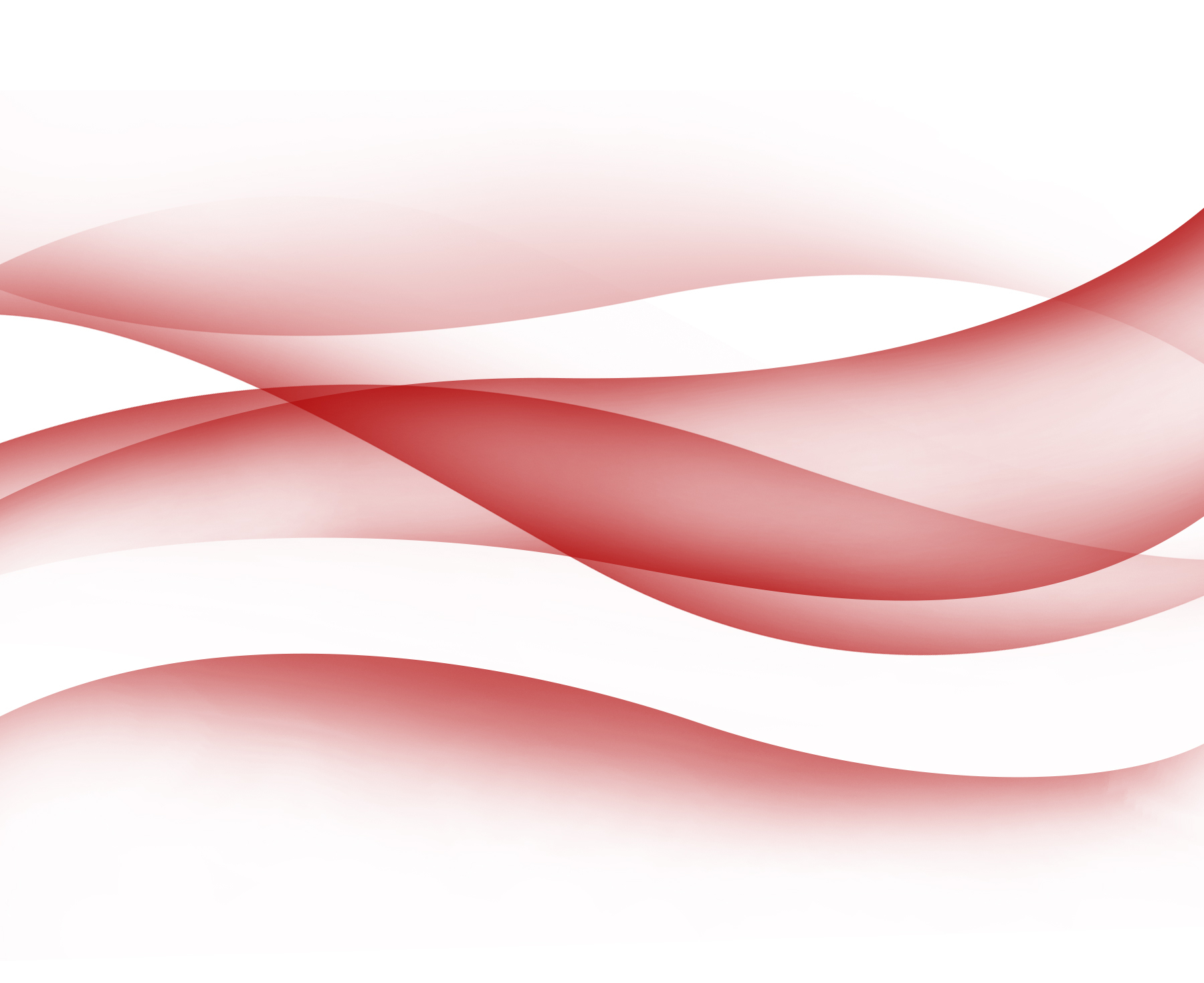
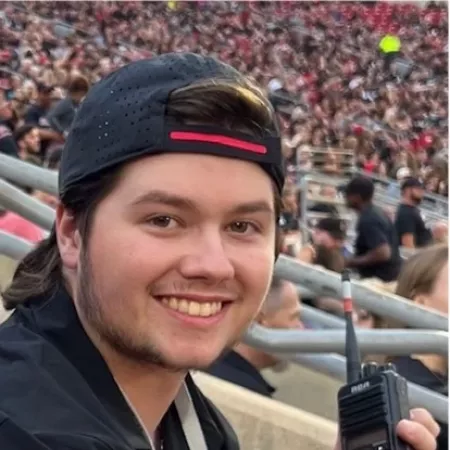
My internship opened my eyes to a whole career that I had not considered before. Getting to do things hands-on and see them in person was amazing!
